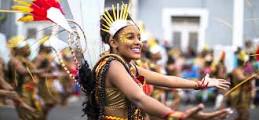By Isah Aliyu Chiroma
“A country that can feel so criminally comfortable when most of its finest writers and artists have been forced into exile, can hardly be regarded as a serious place for culture and enlightenment. After all, gold can only be appreciated by those who know its value”.
–Niyi Osundare
Let’s discuss Nigerian book and arts festivals. Literary festivals all the over country have been the source of a lot of discussion; this has emerged as a means of bringing together readers who are interested in the same areas of the art world. Throughout those years of their development, certain really important issues have been highlighted. discussions that expose our county’s problems and, in the long run, offer solutions. The Port Harcourt Book Festival, the Lagos Book and Art Festival (LABAF), the Kaduna Book and Art Festival (KABAFEST), the Aké Arts and Book Festival, the Nigeria International Book Fair (NIBF), the Hausa International Book and Arts Festival (HIBAF), the Borno Book and Arts Festival, and the Yobe Peace and Arts Festival are just a few of these events.
Over time, these celebrations have transformed our society, doing everything from reducing illiteracy by promoting a reading-friendly culture to bridging the historical and cultural divide—which most schools have neglected to address. A platform like this is designed to bring together creative minds from diverse culture and religion to share ideas in order to awaken those difficulties and handle concerns we find ourselves. The festivals’ objectives of altering the narrative and improving society through art have been accomplished. Because of the benefits the festival will bring to their culture, the audience is expanding and more individuals are expressing interest in what is being done.
These festivals have been altering narratives and closing gaps in history, culture, and all forms of art. The Sokoto Book and Arts Foundation organizes the annual arts and literature festival in Sokoto. It aims to recognize and celebrate the arts and literature in a place where both genres have historically been underappreciated. The festival offers a venue for established and upcoming artists in the state to present their work and learn from experts and from one another through a variety of activities. Over the years, the Foundation, which was established via the partnership of the Poetry Club UDUS, Caliphate Arts and Literary Forum, and Book O’clock, has drawn writers, painters, photographers, publishers, academicians, and students from a variety of fields, backgrounds, and ethnicities.
After the concept was conceived, it became clear that we are introducing something new to a setting recognized for its history and culture, which dates back as far as we can remember. This caused the first edition to be received with mixed feelings.
The Sokoto Book and Arts Festival will also take place this year. The festival encourages and supports Sokoto’s artistic and cultural sectors. The festival includes a wide range of online and offline events, including book talks, panel discussions, art exhibitions, film screenings, plays, poetry readings, music performances, dance performances, and much more. Over 500 art enthusiasts from the state and outside it has participated in these events over the course of the festival’s last two iterations. The event this year will build on last year’s by exploring more of the artistic and cultural legacy of the Caliphate and the case for its revival.
Others may view the Sokoto Book and Arts Festival as a celebration of literature, art, and culture, but for me, it has served as a springboard for development. It all started with a volunteer who is passionate about writing and quest to change the narration. It has been a journey of learning and relearning during the past two years, and this year, your young columnist will be co-curating the festival. I suppose you’ll see where I’m at now—after years of education, you’ve been given the responsibility of curating one of the greatest festivals to emerge from northern Nigeria.
In order to prepare the volunteers for the work they will be doing and equip them with some skills that each of them is required to possess, we hosted a workshop for them last week in preparation for the 2023 edition of SOBAFest. The workshop covered volunteering, what it entails, and who qualifies as a volunteer. The course also covered teamwork and how to run a project and raise funds. How to collaborate with people who have various points of view in order to reach a more comprehensive goal.
This edition is one you can’t afford to miss as we reveal to our audience our festival activities, guest lineup, and what to expect in full anticipation of the festival. Utilize our social media handles to keep up with our activities and remain in touch. The Sokoto Book and Arts Festival serves as a vehicle for us to influence the changes we wish to see in our society because we all have different means of doing so. Together, we can change lives in our own modest ways!



